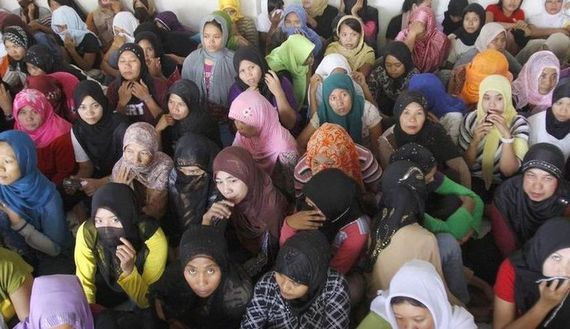Helping The Help: Saudi Arabia Moves To Improve Rights And Protection Of Indonesian Domestic Workers

The government of Saudi Arabia has agreed to upgrade and guarantee the rights of hundreds of thousands of Indonesian maids who toil in the kingdom, following four years of demands by the Indonesian government due to numerous allegations of abuse by Saudi employers. Under the new memorandum of understanding, Indonesian domestic workers will no longer have their passports confiscated by their employers nor barred from communicating with outsiders. In addition, the maids will be guaranteed regular monthly wage payments, sick leave, days off and a one-month paid holiday every two years. The Jakarta Post reported that the bilateral agreement also guaranteed every worker access to cell phones, health insurance and the ability to reach a 24-hour call center if in need of help.
In exchange for these concessions, Indonesian authorities must confirm that prospective employees have no criminal records and can pass a medical exam. In addition, the Saudi agreement also stipulates that Indonesian workers must “respect” Islam, carry out their responsibilities "perfectly," as well as "obey the employer," and not to "reject work or leave the job without any genuine reason". “We want this agreement to improve the protection and welfare of our domestic workers. This is a better system for the placement and protection of the workers,” said Indonesia’s Manpower and Transmigration Minister Muhaimin Iskandar. Muhaimin added that Saudi Arabia had indeed made improvements in its protection of foreign migrant workers, including domestics from his country and characterized the new agreement as “historic.” “We want Saudi Arabia to give special attention to Indonesian migrant workers,” he added.
Jakarta officials warned, however, that they will not allow further migration of their workers to Saudi Arabia until it is satisfied that Riyadh adequately implements the new program. Indonesia imposed a moratorium on sending more workers to the royal kingdom in August 2011. That moratorium was enacted after the Saudis executed a 54-year-old Indonesian maid named Ruyati binti Satubi in June 2011 for murdering the wife of her employer – the Saudis did so without informing Indonesian officials beforehand. “We’re preparing the system on how we are going to place and protect migrant workers. After that, we will involve stakeholders from both countries to prepare the infrastructure,” Manpower and Transmigration ministry spokesman Suhartono said.
According to data from the Agency for the Placement and Protection of Indonesian Migrant Workers, there are now about 1.2 million Indonesians working in Saudi Arabia -- more than 70 percent of them household workers. Over the years, Indonesian maids have been subject to numerous acts of maltreatment by Saudis, including overwork, deprivation of food and wages, forced confinement and even sexual abuse, BBC noted. Indonesians who had tried to complain and report their employers’ grievous conduct have sometimes themselves faced prosecution, including charges of theft and “sorcery.” Meanwhile, the Jakarta Post noted, nine migrant workers are languishing in Saudi jails awaiting execution after they were convicted of murdering their employers -- including a Javanese woman named Satinah, who was sentenced to die in 2009. She allegedly killed her employer to retaliate against abuse.
Due to these and other issues, some Indonesian lawmakers are unhappy with the new labor rights agreement with Saudi Arabia. The Jakarta Globe reported that a member of Indonesian’s House of Representatives Commission IX which oversees manpower issues recommended the government go slow in dealing with the Saudis. Rieke Diah Pitaloka, a member of the Indonesian Democratic Party of Struggle (PDI-P), complained that details of the agreement were never debated by lawmakers in the assembly. Anis Hidayah, the director of Migrant Care, a workers rights advocacy group, said the Indonesian government should not have signed the agreement before receiving a guarantee that the Saudi would abide by its terms. “There should have been public discussion before signing the agreement with Saudi Arabia,” she said, according to the Globe.
Human Rights Watch, a New York-based activist group, which has detailed abuses upon Indonesian and other migrant workers in Saudi Arabia, also said the new agreement does not go far enough. “The labor regulations and new pact are slow moves in the right direction, but neither have clear enforcement mechanisms for a group of workers typically isolated in private homes, unaware of their rights, and unable to speak Arabic,” wrote Nisha Varia, HRW’s Senior Researcher in the Women’s Rights Division.
“These reforms [also] do not address the long history of workers coming forward with complaints only to be slammed with counter-allegations of theft, witchcraft, or adultery by their far more influential, well-connected, and often wealthy employers.” Varia also said that the Saudis need to make changes in its restrictive ‘kafala’ system, under which employers receive “inordinate power” by gaining control over when a migrant can change employers or leave the country. “It should bring its labor laws in line with the protections outlined in the International Labour Organization’s Domestic Workers Convention,” she added.
© Copyright IBTimes 2025. All rights reserved.





















